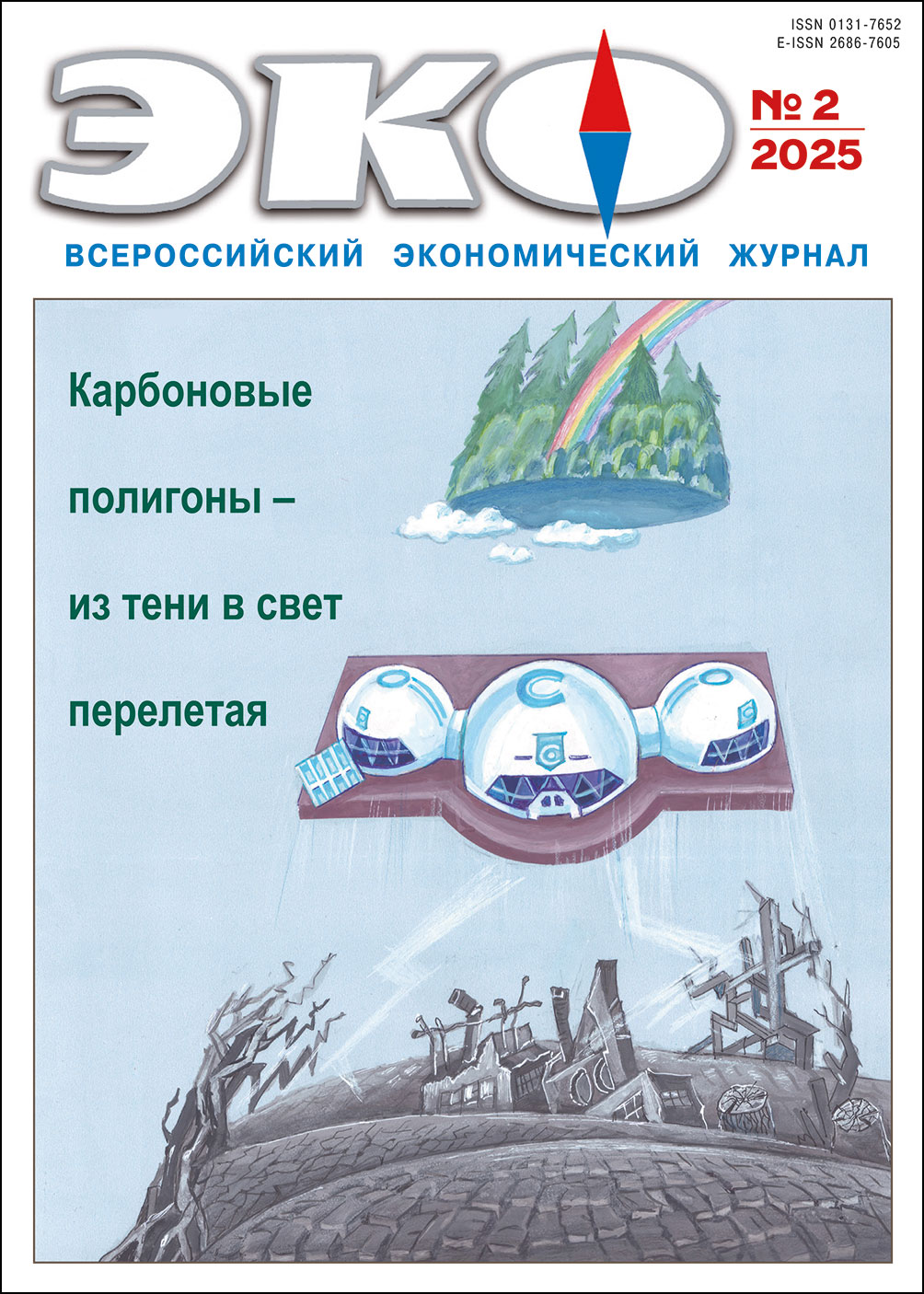Cover story: Carbon Testing Grouds – Passing from Shadov to Light
The National Policy for Sustainable Development of Russia: the Place and Role of Regions
Published 2025-04-02
Keywords
- sustainable development; climate change adaptation; decarbonization; low-carbon economy; Russian regions; ESG rankings; methodological guidance
How to Cite
1.
Konstantinidi Х, Pakhalov А. The National Policy for Sustainable Development of Russia: the Place and Role of Regions. ECO [Internet]. 2025 Apr. 2 [cited 2026 Mar. 5];55(2):54-69. Available from: https://ecotrends.ru/index.php/eco/article/view/4846
Abstract
The paper reviews the institutional prerequisites for the “sustainable” transformation of Russia's regions that are being created at the federal level. Special attention is paid to a number of initiatives aimed at involving regional authorities in the decarbonization and sustainable development agenda, among which ESG rankings and ratings, as well as sectoral methodological recommendations stand out. The authors show that such projectsnot only raise the awareness of regional administrations about environmental and social problems, but also stimulate their solution through visual demonstration of the importance and feasibility of implementing sustainable development principles.References
- Константиниди Х.А., Пахалов А.М. Внедрение принципов устойчивого развития в туризме и гостеприимстве: опыт разработки национальных методических рекомендаций // Международный научный сборник Вестник индустрии гостеприимства. Т. 13. Санкт-Петербург: Санкт-Петербургский государственный экономический университет, 2023. С. 32–38.
- Мельник А., Наумова И., Ермолаев К. Трансформация управления инновационным развитием для решения проблем декарбонизации и роста энергоэффективности // Форсайт. 2023. Т. 17. № 1. С. 51–66.
- Михлина Н.В. Концепция устойчивого развития и климатическая повестка как аспекты новой парадигмы прокурорского надзора // Законность. 2025. № 1.
- Никитин А.С. Инвестиционный рейтинг как инструмент стимулирования эффективности управления развитием регионов России // Экономическая политика. 2016. Т. 11. № 6. С. 192–221.
- Скоков Р., Гузенко М. Сахалинский эксперимент достижения углеродной нейтральности // Энергетическая политика. 2023. № 2 (180). С. 86–99.
- Bataille, C., Waisman, H., Colombier, M., Segafredo, L., Williams, J., Jotzo, F. (2016). The need for national deep decarbonization pathways for effective climate policy. Climate Policy. No. 16(sup1), S7-S26. DOI: 10.1080/14693062.2016.1173005
- Bevacqua, E., Schleussner, C.F., Zscheischler, J. (2025). A year above 1.5 °C signals that Earth is most probably within the 20-year period that will reach the Paris Agreement limit. Nature Climate Change, 1–4. DOI: 10.1038/s41558–025–02246–9
- Chen, J.M. (2021). Carbon neutrality: Toward a sustainable future. The Innovation. No. 2(3). DOI: 10.1016/j.xinn.2021.100127
- Diaz, D., Moore, F. (2017). Quantifying the economic risks of climate change. Nature Climate Change. No. 7(11). Pp. 774–782. DOI: 10.1038/nclimate3411
- Ergasheva, S.T., Zinovyeva, I.S., Abdurashitov, A.A., Kopytina, Y.A., Makarova, T.V. (2023). ESG Investments in Support of the Development of the Green Economy in Russia and Central Asia. In ESG Management of the Development of the Green Economy in Central Asia. Pp. 419–428. Cham: Springer International Publishing. DOI: 10.1007/978–3–031–46525–3_44
- Sharmina, M., Anderson, K., Bows-Larkin, A. (2013). Climate change regional review: Russia. Wiley Interdisciplinary Reviews: Climate Change. No. 4(5). Pp. 373–396. DOI: 10.1002/wcc.236
- Shvarts, E., Pakhalov, A., Knizhnikov, A., Ametistova, L. (2018). Environmental rating of oil and gas companies in Russia: How assessment affects environmental transparency and performance. Business Strategy and the Environment. No. 27(7). Pp. 1023–1038. DOI: 10.1002/bse.2049
- Valko, D. (2021). Environmental attitudes and contextual stimuli in emerging environmental culture: An empirical study from Russia. Sustainable Production and Consumption. No. 27, 2075–2089. DOI: 10.1016/j.spc.2021.05.008
- Zhao, X., Zeng, B., Zhao, X., Zeng, S., Jiang, S. (2024). Impact of green finance on green energy efficiency: a pathway to sustainable development in China. Journal of Cleaner Production. No. 450, 141943. DOI: 10.1016/j.jclepro.2024.141943
- Zhong, J., Pei, J. (2024). Carbon border adjustment mechanism: a systematic literature review of the latest developments. Climate Policy. No. 24(2), 228–242. DOI: 10.1080/14693062.2023.2190074

